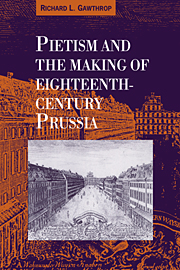Book contents
- Frontmatter
- Contents
- Preface
- Introduction
- 1 The German territorial state in the sixteenth and seventeenth centuries
- 2 Reformed confessionalism and the reign of the Great Elector
- 3 The nature of the pre-1713 Hohenzollern state
- 4 Lutheran confessionalism
- 5 Spenerian Pietism
- 6 From Spener to Francke
- 7 Halle Pietism I: ideology and indoctrination
- 8 Halle Pietism II: growth and crisis
- 9 Pietist–Hohenzollern collaboration
- 10 The impact of Pietist pedagogy on the Prussian army and bureaucracy
- 11 Civilian mobilization and economic development during the reign of Frederick William I
- Conclusion
- Bibliography
- Index
7 - Halle Pietism I: ideology and indoctrination
Published online by Cambridge University Press: 14 October 2009
- Frontmatter
- Contents
- Preface
- Introduction
- 1 The German territorial state in the sixteenth and seventeenth centuries
- 2 Reformed confessionalism and the reign of the Great Elector
- 3 The nature of the pre-1713 Hohenzollern state
- 4 Lutheran confessionalism
- 5 Spenerian Pietism
- 6 From Spener to Francke
- 7 Halle Pietism I: ideology and indoctrination
- 8 Halle Pietism II: growth and crisis
- 9 Pietist–Hohenzollern collaboration
- 10 The impact of Pietist pedagogy on the Prussian army and bureaucracy
- 11 Civilian mobilization and economic development during the reign of Frederick William I
- Conclusion
- Bibliography
- Index
Summary
FRANCKE'S REFORM VISION
One feature of Pietism that set it apart from earlier Lutheran movements was its expectation that the creation of new institutional forms within the established order would serve as the basis for an all-embracing reform of society. Because “reform” meant the spread of a particular form of piety, the personal religious orientation of the founder of Pietist institutions played a determining role in shaping the character of these organizations. Even though Spener and Francke shared a common spiritual ancestry and were close political allies, Francke's conversion experience and his Promethean emphasis on action resulted in an aggressive militancy that was not present in Spener. Not surprisingly, Francke's Anstalten in Halle displayed greater coherence and tighter discipline than Spener's widely scattered and loosely coordinated network of conventicles. Points of difference between the two men, moreover, went beyond organizational style to include goals and tactics. Spener believed that reform of the Lutheran church would, eventually and in some unspecified way, bring about the desired change in society. The more radical Francke worked for the simultaneous transformation of both the church and the social order. Francke envisioned the Halle Anstalten, therefore, as a model society, complete with institutions for socialization and economic activity, whose expansion would begin a reform of the entire world.
The years immediately after 1700 afforded Francke the opportunity to develop a strategy for accomplishing his mission.
- Type
- Chapter
- Information
- Pietism and the Making of Eighteenth-Century Prussia , pp. 150 - 175Publisher: Cambridge University PressPrint publication year: 1993



